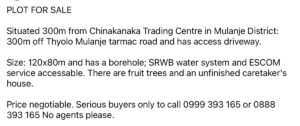
* In line with the impending phasing out of cheques by December 31, 2025 as use of cheques in Malawi has steadily declined over the years
* Due to increased demand for technological modes of payments as regulatory statistics indicate that only about 2% of value and 0.04% of the volume of all retail payments are made through cheque payments
By Duncan Mlanjira
In line with the impending phasing out of cheques by December 31, 2025 — coupled with the general decline in the value of the Malawi Kwacha and has inflation, National Bank of Malawi (NBM) has increased various cash transaction limits on the digital channels.
In an internal circular to members of staff, dated November 4, 2025, head of digital finance services, William Kaunda indicates the increases are with immediate effect — as follows:
BankNet360
* Funds transfers to other banks (instant)-Retail — K120 million new limit from K5 million
* Funds transfers to other banks (instant)-Corporate — K500 million from K50 million
Mo626ice & Mo626 Digital+
* Funds transfer within NBM — K50 million from K5 million
* Funds transfer to other banks K50 million from K3 million
* Funds transfer to Mobile Money (MMO) wallets — K5 million from K750,000
* Airtime purchases remain at K750,000 and bill payments at K10 million up from K500,000.

Advertisement
In April this year, the Reserve Bank of Malawi (RBM) and Bankers Association of Malawi (BAM) announced plans to phase out cheque usage in the country by December 31 to align with global trends of the decline in the use of bank cheques due to increased demand for technological modes of payments, among others.
A joint public notice from RBM and BAM then indicated that cheque payments are governed by the Bills of Exchange Act of 1964 and the Financial Services Act of 2016, “whose responsible authorities are in the process of amending the legal instruments and the definitive date for discontinuing cheque usage in the country will be announced upon completion of the process”.
“Nevertheless, it is imperative that as a nation, we begin transitioning to alternative payment systems to ensure the continued safety and stability of our national payments infrastructure,” said the joint public notice.

The two financial institutions takes cognizance that the use of cheques in Malawi has steadily declined over the years due to increased demand for technological modes of payments and — following a comprehensive review and engagements with key stakeholders as well as in consideration of regional developments in the payment industry — it justifies the decision for the cheque cessation.
According to BAM and RBM, the justification stems from cost and efficiency consideration amidst low usage — as regulatory statistics indicate that only about 2% of value and 0.04% of the volume of all retail payments are made through cheque payments.
“As a result of this low usage, service providers are finding it costly to maintain the infrastructure and processes relating to cheque payments,” said the statement. “Thus, the cessation of cheques will save the economy the foreign currency usually associated with the maintenance or importation of clearing platforms, scanners, software, bandwidth and cheque base stocks.
“In addition, the cheque payment, clearing and settlement arrangements are synonymous with time-consuming process requiring frequent costly reviews and enhancements.”



Advertisement
The notice further says the comprehensive review also considered financial security, since “cheques as a payment instrument is highly vulnerable to fraud, forgery and counterfeiting — leading to financial losses on the service providers and consumers”.
“Thus, the discontinuance of cheques will enhance the reputation and integrity of the banking and payments industries in the country,” said the statement, while emphasising that financial inclusion for all was considered, of the “hitherto underserved and rural-based segments of our population”.
The two institutions also say this initiative is part of “greening the payments landscape” as cheques have a high carbon footprint due to the paper manufacturing process and inks used — thus the cessation will, therefore, assist in promoting the green environment in Malawi.



Advertisement
